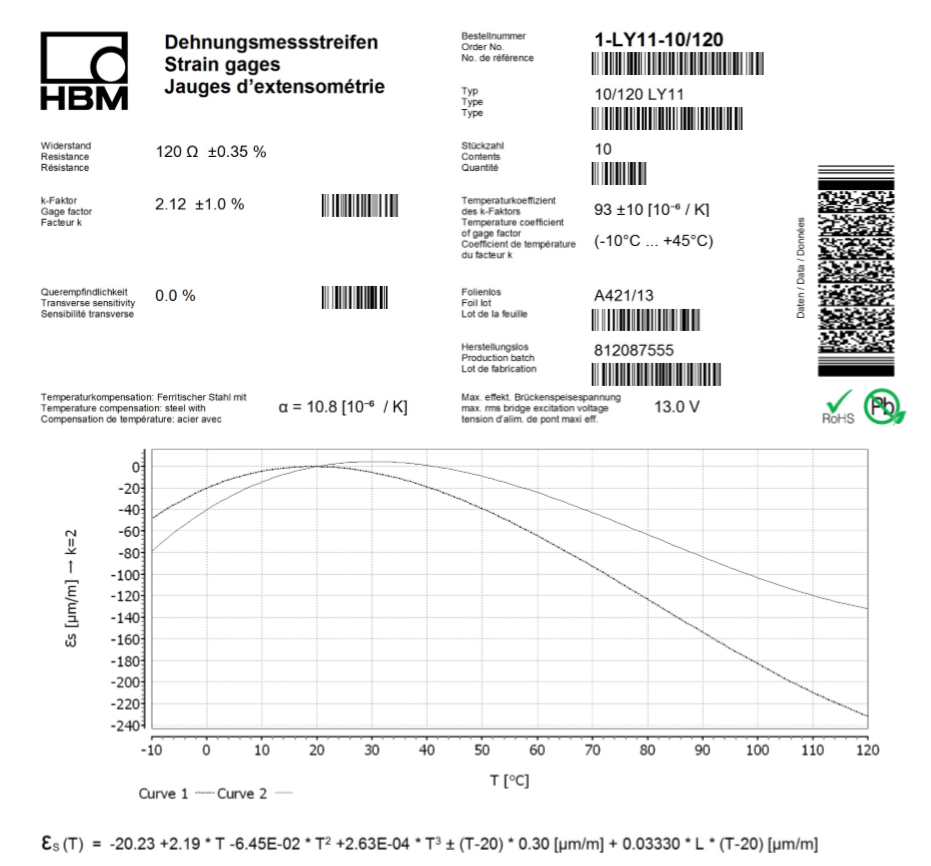StrainGaugeTemperatureCompensation (FPScript)
Performs temperature compensation for a strain signal measured using a strain gauge.
Syntax
StrainGaugeTemperatureCompensation(Strain, Temperature, PolynomialCoefficients, GaugeFactor, GaugeFactorTemperatureCoefficient, ReferenceTemperature, [ StrainGaugeTEC = 0 10^-6/K ] [ , MaterialTEC = 0 10^-6/K ])
The syntax of the StrainGaugeTemperatureCompensation function consists of the following parts:
Part |
Description |
|---|---|
Strain |
Symbol: εu(T). A measured strain data set of a strain gauge. If Unit Manager is switched off, the data set must be present in the unit µm/m. Permitted data structures are data series und signal. All numeric data types are permitted. If the argument is a list, then the function is executed for each element of the list and the result is also a list. |
Temperature |
Symbol T. A measured temperature data set. If Unit Manager is switched off, the data set must be present in the unit °C. Permitted data structures are data series und signal. All numeric data types are permitted. If the argument is a list, then the function is executed for each element of the list and the result is also a list. |
PolynomialCoefficients |
Symbol: a0, a1, ... . A data series with the polynomial coefficients, determined from the data sheet of the strain gauge. Here the first value is coefficient a0the second value is coefficient a1, etc. Permitted data structures are data series. All numeric data types are permitted. If the argument is a list, then the function is executed for each element of the list and the result is also a list. |
GaugeFactor |
Symbol: kD. The k-factor, determined from the data sheet of the strain gauge. Permitted data structures are scalar value. All numeric data types are permitted. If the argument is a list, then the first element in the list is taken. If this is also a list, then the process is repeated. |
GaugeFactorTemperatureCoefficient |
Symbol: αk. The temperature coefficient of the k-factor, determined from the data sheet of the strain gauge. The unit is 1/K. Permitted data structures are scalar value. All numeric data types are permitted. If the argument is a list, then the first element in the list is taken. If this is also a list, then the process is repeated. |
ReferenceTemperature |
Symbol: TRef. The reference temperature, determined from the data sheet of the strain gauge. If Unit Manager is switched off, the data set must be present in the unit °C. Permitted data structures are scalar value. All numeric data types are permitted. If the argument is a list, then the first element in the list is taken. If this is also a list, then the process is repeated. |
StrainGaugeTEC |
Symbol: αSG. The coefficient of thermal expansion of the strain gauge material used, determined from the data sheet of the strain gauge. The unit is 10^-6/K. Permitted data structures are scalar value. All numeric data types are permitted. If the argument is a list, then the first element in the list is taken. If this is also a list, then the process is repeated. If this argument is omitted, it will be set to the default value 0 10^-6/K. |
MaterialTEC |
Symbol: αM. The coefficient of thermal expansion of the material used on which the measurement is performed. If the material is not different from the strain gauge material, the value is identical to StraingGaugeTEC. The unit is 10^-6/K. Permitted data structures are scalar value. All numeric data types are permitted. If the argument is a list, then the first element in the list is taken. If this is also a list, then the process is repeated. If this argument is omitted, it will be set to the default value 0 10^-6/K. |
Remarks
The function performs a temperature compensation of a strain signal measured by means of a strain gauge. Here it is assumed that the strain gauges are self-compensated, i.e. the influence of the cable resistance has already been eliminated. The temperature influence of strain gauge installation tape is also not taken into account. The residual error is determined by a polynomial function specified in the data sheet of the strain gauge.
In addition to the polynomial function, the formula used includes the temperature dependency of the k-factor and additional consideration of a deviation between the thermal expansion coefficient of the material on which the measurement was performed and the thermal expansion coefficient of the strain gauge grid material. The following formula is used for temperature compensation:
For complex data types the absolute value is formed.
Available in
FlexPro Professional, Developer Suite
Examples
StrainGaugeTemperatureCompensation('Strain', 'Temperature', {-20.23, 2.19, -6.45E-02, 2.63E-04}, 2.12, 93 * 10^-6, 20, 10.8, 23)
Performs temperature compensation. 23 ppm/K is the coefficient of thermal expansion of the aluminum material used.

See Also
RosetteTransformation Function
Rosette Transformation Analysis Object
References
[1] Hottinger Baldwin Messtechnik GmbH: Temperature compensation of strain gauge ¼-bridges - Clear, brief and understandable. In: Technical Information T05414_01_E00_01. https://www.hbm.com/fileadmin/mediapool/hbmdoc/technical/T05414.pdf,.
[2] Micro-Measurements: Strain Gage Thermal Output and Gage Factor Variation with Temperature. In: Tech Note TN-504-1. http://www.vishaypg.com/docs/11054/tn504.pdf,2014.
